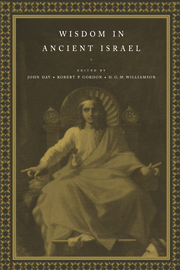Book contents
- Frontmatter
- Contents
- List of abbreviations
- Introduction
- Part 1 The ancient near eastern setting
- Part 2 Old Testament and Apocryphal texts
- Part 3 Themes
- 17 Were there schools in ancient Israel?
- 18 The trees, the beasts and the birds: fables, parables and allegories in the Old Testament
- 19 The personification of Wisdom
- 20 Wisdom and the goddess
- 21 Wisdom at Qumran
- 22 The interpretation of wisdom in nineteenth-century scholarship
- 23 Wisdom and Old Testament theology
- Biographical note: John Adney Emerton
- Bibliography of the works of John Adney Emerton
- Indexes
- Principal biblical and apocryphal references
23 - Wisdom and Old Testament theology
Published online by Cambridge University Press: 16 October 2009
- Frontmatter
- Contents
- List of abbreviations
- Introduction
- Part 1 The ancient near eastern setting
- Part 2 Old Testament and Apocryphal texts
- Part 3 Themes
- 17 Were there schools in ancient Israel?
- 18 The trees, the beasts and the birds: fables, parables and allegories in the Old Testament
- 19 The personification of Wisdom
- 20 Wisdom and the goddess
- 21 Wisdom at Qumran
- 22 The interpretation of wisdom in nineteenth-century scholarship
- 23 Wisdom and Old Testament theology
- Biographical note: John Adney Emerton
- Bibliography of the works of John Adney Emerton
- Indexes
- Principal biblical and apocryphal references
Summary
It is a significant feature of the influential work of Gerhard von Rad that his attention to the role of wisdom in the growth of the biblical tradition emerged after the completion of his magnum opus on Old Testament theology. This phenomenon reflects a wider characteristic of the manner in which the many and varied attempts to construct an Old Testament theology have developed during the twentieth century, usually with relatively minor attention being given to the wisdom tradition. Since 1970, however, when von Rad published a stimulating study of the Israelite wisdom tradition, the interest in it among scholars has grown immeasurably. This has not simply been a direct consequence of von Rad's attention to the subject, but is a reflection of the profound change of perception regarding the origin and nature of the wisdom tradition which was already in process. From being regarded as an aberrant offshoot of the mainstream of Israelite-Jewish religious life, it has increasingly been claimed as its most profoundly intellectual dimension, and consequently one that has primary interest for Old Testament and biblical theology.
Wisdom and the structure of Old Testament theology
Clearly part of the difficulty lies with the lack of any agreement on the question where the centre, and consequently the structural shape, of an Old Testament theology is to be found. From a rigidly canonical perspective it might appear that since all the wisdom literature is to be found in the third, and consequently least authoritative, division of the Hebrew canon, its role within a theology must inevitably be a minor one.
- Type
- Chapter
- Information
- Wisdom in Ancient Israel , pp. 269 - 286Publisher: Cambridge University PressPrint publication year: 1995
- 3
- Cited by



